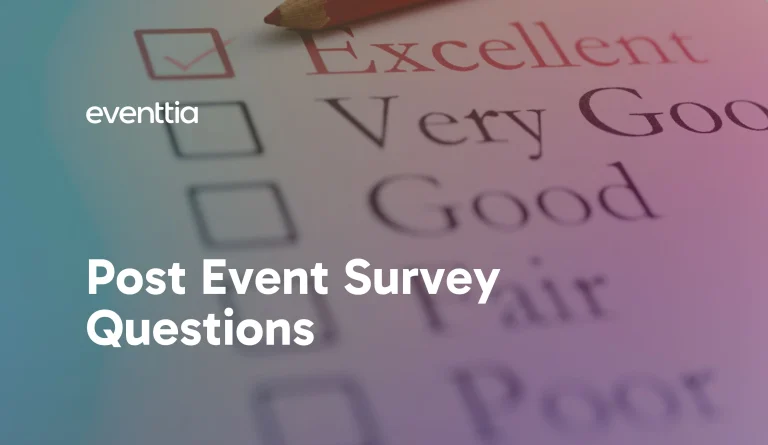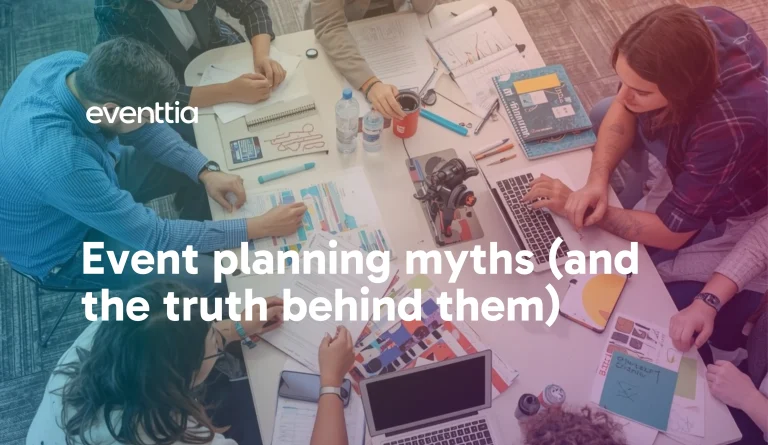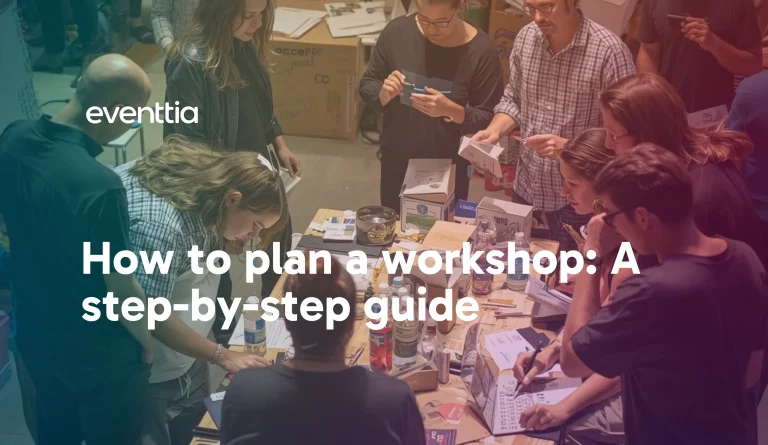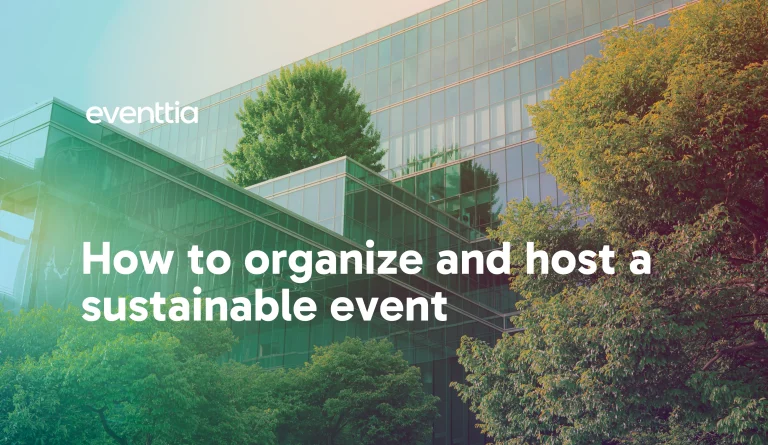Post-Event Survey Questions: Quick Summary
What is a post-event survey and why does it matter?
A post-event survey is a questionnaire sent to attendees, staff, sponsors, or speakers to collect feedback on their experiences. It helps measure event success, uncover improvement opportunities, and strengthen relationships for future events.
Benefits of post-event surveys:
Gain insights on attendee satisfaction, venue, speakers, catering, networking, and logistics.
Improve future events with real suggestions from participants.
Measure ROI, compare multiple events, and track attendee engagement over time.
Demonstrate value to sponsors and partners by showcasing measurable results.
Strengthen community and encourage repeat attendance.
Types of post-event survey questions:
Open-ended: “What part of the event did you find most valuable?”
Closed-ended: Rating scales, multiple choice, yes/no, or Likert scales.
Demographic: Age, industry, location, role, reason for attending.
Role-specific: Questions tailored for attendees, employees, volunteers, sponsors, or speakers.
Examples of questions to ask:
On a scale of 1–5, how satisfied were you with the event overall?
What was your favorite session or activity, and why?
Did the event meet your expectations?
Would you recommend this event to a colleague?
What’s one thing we should improve for next time?
How likely are you to attend this event again?
Best practices for post-event surveys:
Send within 24–48 hours while memories are fresh.
Keep surveys short but diverse (mix of qualitative and quantitative).
Thank participants and consider offering small incentives.
Use multiple channels (email, event app, social media).
Follow up with reminders, but don’t spam.
While the planning and execution of an event gets a lot of attention, it’s crucial not to forget about the work that comes after an event. This effort helps you learn how your event was received by participants, what parts of the event were a hit, and which fell flat.
Thankfully, event organizers are catching on and are putting more effort into post-event activities. In fact, 92% of event marketers plan to improve their post-event attendee follow-up efforts to extend the impact of their events.
But while thanking attendees and sharing useful information from the event is important, so is gathering feedback via post-event surveys. The more detailed the feedback you receive, the more useful the insights you may uncover.
This guide is going to take a closer look at the importance of post-event surveys and go over some of the best questions to ask, how to ask them, and so much more.
What is a Post-Event Survey?
A post-event survey is a type of questionnaire that’s designed to gather feedback from attendees and get their thoughts and experiences regarding your event. It can contain a variety of questions, and may be sent to participants in numerous different ways.
Asking survey questions after an event is a great way to see whether attendees were satisfied with the event or not, and whether it aligned with their interests and expectations. It may also show you the elements of your event that were the most valuable and impactful for participants.
In addition to post-event surveys, you can also send out survey questions before or even during your event.
No matter what kind of event survey you want to send, using a platform like Eventtia can help you create your surveys from scratch, send them to your attendees, and even view survey results to see how your participants responded.
Why Are Post-Event Surveys Important?
There are numerous reasons why post-event surveys are important and shouldn’t be ignored by organizers.
Gain Insights
Firstly, you can gain incredibly valuable insights about the attendee experience through a post-event survey. You can learn what people thought about the venue, the speakers, the exhibits, the food, the staff, the activities, the networking opportunities, and more.
You can also gather useful data about why people attended the event, what they hoped to get out of the experience, and how important your event is to their business or career.
For example, the organizers of the International Woodworking Fair learned how important the show was to businesses in the industry, thanks to a post-event survey. The survey results found that the fair, which attracts well over 20,000 attendees each year, is the most important show of the year for 85% of attendee businesses.
In addition to that, 80% of respondents said that the conference is also their primary source of new woodworking-related technologies and products.
Improve Future Events
You can also use the insights you gather from event survey questions to improve future events based on attendee suggestions or comments. Constructive feedback from attendees may help you improve the registration process, choose a better venue, improve staffing, or even get higher-quality catering.
A good example of this is what the Island Exodus music festival did recently. The festival moved locations for the first time in years after taking fan-suggested improvements from a post-event survey into account.
In particular, the survey helped organizers learn that attendees wanted more modern rooms, better food/more options, a nicer beach, and easier transportation to/from the airport.
Measure the Success of an Event
Survey responses can also help determine the overall success of an event. If many people respond positively to your survey and/or show an interest in attending future events, it’s a good sign that it was successful.
Other signs of a successful event are when it matches the expectations of attendees, when it aligns with participant needs and interests, and when it facilitates important interactions and connections between attendees.
If you host multiple events, these surveys can also be incredibly valuable for comparing events to one another. In particular, you can use the results to take positive aspects from a successful event and see if there are ways to incorporate them into another event to boost the chances of success.
For example, the Ironman Triathlon Series uses post-event surveys every year to gather athlete feedback to give out Athletes’ Choice Awards to different race events. Events that rank highly or win awards are likely deemed a success by organizers, while those that receive lower positive feedback know they have some work to do, and may take some ideas from the winning races.
Types of Post-Event Survey Questions
Now that you’re aware of what post event surveys are and why they matter, let’s go over the types of post-event survey questions you may ask and some examples of each type.
Open-Ended Event Survey Questions
Open-ended questions do not have a simple yes or no answer, and instead ask respondents to elaborate and write their own individual answer. These answers provide valuable qualitative data about attendee experience and opinions and may help you see things from their perspective.
Some examples of open-ended questions you could ask in your post-event survey include:
- Which part of the event did you think was the most valuable?
- Which interactive activity was the most fun at the event?
- If you could change one thing about the event, what would it be?
- Which topics did you wish we had covered more thoroughly during the event?
- What was your least favorite part of the venue for the event?
Closed-Ended Event Survey Questions
Closed-ended questions are questions that don’t allow for elaboration or individual responses, as all respondents must choose from the same selection of prearranged answers. These answers are great for providing quantitative data and are often easier to analyze.
Some types of closed-ended questions you can use include yes/no questions, true/false questions, checkboxes, or multiple-choice questions.
There are also Likert scale questions, which rank an attendee’s satisfaction from one extreme to the other. You may also use rating scale questions, which let you measure the opinions of participants on a scale, such as a numbered scale (0 to 10) or a star rating scale (1 star to 5 stars).
A few closed-ended questions you may want to include in your surveys include:
- What’s your level of satisfaction with the event? (Not satisfied at all, somewhat dissatisfied, neutral, satisfied, very satisfied)
- Would you recommend this event to a friend or coworker? (Yes or no)
- I feel like the content of the conference matched up with my expectations (True or false)
- On a scale of 0 to 10, how relevant did you find the speakers at this event?
- I’m satisfied with the food and beverage options at the event (Strongly Agree, Agree, Neutral, Disagree, Strongly Disagree)
- How likely are you to attend this event again in the future? (Very likely, likely, Unsure, Unlikely, Very unlikely)
- Which speaker provided the most useful insights in your opinion? (Speaker A, Speaker B, Speaker C, Speaker D, Speaker E)
Demographic Event Survey Questions
Demographic questions are designed to gather information about your attendees, such as their age, their interests, what they want from your event, their level of education, where they live, and more. These questions give you insights that help you create or fine-tune your buyer persona, and may help you learn who most frequently attends your events.
The more you know about your participants, the better you’re able to personalize your events to appeal more to them in the future. For example, according to research on Gen Z and event trends, 87% of respondents say that discovering new products is the most important part of attending events, while 77% say that inspiration and excitement are crucial for a good on-site event experience.
As a result, if you have plenty of Gen Z attendees, it may be worthwhile to highlight new products whenever possible and set up inspiring and exciting things to do.
Some examples of demographic questions you could ask in a survey are:
- What’s the highest level of education that you’ve completed?
- Are you from the city where the event was held? If not, where are you from?
- What industry are you in?
- Why did you attend this event?
- What is your age group? (<24, 25-34, 35-44, 45-54, >54)
Examples of Post-Event Survey Questions for Event Participants
Now that you know the different types of post-event survey questions, here are a few examples for different event types.
Generic Questions for any Event
- On a scale of 1 to 5, how satisfied were you with the event overall?
- Did the event meet your expectations?
- What was the most valuable part of the event for you?
- On a scale of 1 to 5, did you enjoy the event duration and program? If not, what would you have changed?
- On a scale of 1 to 5, how would you rate your experience with the event’s digital experience (registration, event website, app, check-in)?
- According to you, how can we improve this event in the future?
- On a scale of 1 to 5, how likely are you to attend or recommend this event in the future?
- Which part of the program was your favorite, and why?
Conferences, Seminars, Workshops, Webinars
Conferences and workshops are events where several professionals in an industry come together to make connections, build networks, attend seminars, share knowledge, and learn new things.
Some questions to consider asking after hosting a conference or webinar:
- Which conference or seminar was your favorite? And why?
- How relevant was the conference to your current job/role? (Very relevant, Relevant, Somewhat relevant, Irrelevant, Very irrelevant)
- Was the conference easy to follow and understand? (Yes, No)
- On a scale of 1 to 5, how relevant and useful was the content presented?
- On a scale of 1 to 5, how would you rate the speakers or presenters?
- What are some things we could include to improve future workshops?
Networking Events
Compared to conferences, networking events are often more laid back and informal, and focus primarily on meeting new people in your industry and/or developing relationships. These may be in the form of a cocktail hour, a discussion, or even a speed-networking event.
A few questions you may want to ask participants after a networking event include:
- On a scale of 1 to 5, how well were you able to make connections?
- How many new connections did you make at the event?
- On a scale of 1 to 5, how would you rate the quality of the new connections you made at the event?
- Was there enough time to make the connections you wanted, or should the event have been longer?
- Do you have any suggestions for improving the next networking event we put on?
In-Person Events
Here are some specific examples of survey questions you might ask attendees after an in-person event:
- On a scale of 1 to 5, how did you like the venue?
- Finding and navigating the venue was easy (Strongly Agree, Agree, Neutral, Disagree, Strongly Disagree)
- The provided services (Catering, parking, toilets, etc.) were great (Strongly Agree, Agree, Neutral, Disagree, Strongly Disagree)
- The internet connection was fast and efficient (Strongly Agree, Agree, Neutral, Disagree, Strongly Disagree)
Virtual & Hybrid Events
Virtual Event powered by Eventtia.
Some great survey questions to ask virtual event attendees in a post-event survey are:
- On a scale of 1 to 5, how easy was it to navigate the virtual event platform?
- Did you encounter any bugs, glitches, or other performance-related issues? If so, what were they?
- How satisfied were you with the networking opportunities within the virtual platform? (Very satisfied, satisfied, neutral, dissatisfied, Very dissatisfied)
- Which virtual features did you enjoy, and which could use some work for future events?
Examples of Post-Event Survey Questions for Employees, Volunteers, Speakers and Sponsors
While gaining feedback from the people who attended your event is important, don’t forget to ask for information from those who helped the event run smoothly, as well. This includes your employees, volunteers, sponsors/partners, and speakers.
Here are some event survey questions you can ask each group of attendees.
Employees
- On a scale of 1 to 5, how well do you feel the event went?
- I feel that this event was well organized. (Strongly Agree, Agree, Neutral, Disagree, Strongly Disagree)
- How well did you understand your role for this event?
- Do you feel that leadership did a good job of assigning responsibilities and delegating tasks or not?
- What is one thing that you feel would have helped the event go even more smoothly that we should keep in mind for next time?
Volunteers
- How likely are you to volunteer at this event again in the future? (Very likely, Likely, Unsure, Unlikely, Very unlikely)
- On a scale of 1 to 5, how willing are you to recommend volunteering at this event to your friends, family, and coworkers?
- How well do you feel you were treated by event employees and attendees?
- What was your favorite and least favorite part about volunteering for this event?
- Was the training you received before the event sufficient? If not, how would you have improved it?
Sponsors/Partners
- On a scale of 1 to 5, how relevant were the attendees to your business?
- How happy were you with your sponsorship of the event in general? (Very happy, Happy, Neutral, Unhappy, Very Unhappy)
- Are you open to sponsoring another event in the future? Why or why not?
- Are you satisfied with the return on investment from sponsoring this event? (Very satisfied, Satisfied, Neutral, Dissatisfied, Very dissatisfied)
- How many leads or clients did you generate as a result of the event?
Speakers
- Did you experience any technical issues with any of the audio, video, or production equipment used at the event?
- How engaged did you feel the crowd was during your speech? (Actively engaged, Somewhat engaged, Neutral, Somewhat disengaged, Actively Disengaged)
- Are you open to speaking at another of our events in the future? Why or why not?
- On a scale of 1 to 5, how likely are you to recommend speaking at our event to a friend or colleague?
- How satisfied were you with the pre-event communication about your speech? (Very satisfied, Satisfied, Neutral, Dissatisfied, Very Dissatisfied)
Best Practices for Post-Event Surveys
Here are a few helpful tips to get the most out of your post-event surveys.
Send the Survey Out Quickly
It’s generally best to send the post-event survey out quickly, often within 24 or 48 hours of the event ending. It’s important to send it out while the event is still fresh in your attendees’ minds. If you wait too long, they may forget certain aspects of the event and their experiences and thoughts surrounding it.
It’s also a good idea to send it out a few different ways to increase the chances that participants see it. You may want to send the survey via email, share it with individuals on social media, or put it on your website.
For example, South By SouthWest (SXSW) uses this link for its online feedback from attendees who watched a session. It’s quick, easy, and you can fill it out from any device in seconds.
You can also send the survey out to attendees via your event app if you created one. If you’re interested in creating an intuitive event app for your conference or workshop, consider working with Eventtia to deliver tailor-made event experiences to all of your attendees.
Keep it Short
It’s best to keep the post-event survey as short as possible. The longer a survey is, the more daunting it is for respondents to fill out. While it’s tempting to ask every question to get as much insight as possible, it’s important to respect people’s time and not ask too much of them.
While it’s important to keep it short, don’t hesitate to ask a variety of different questions to keep the survey engaging and ensure you get a good mix of both qualitative and quantitative data.
Thank all Respondents
Somewhere in your survey or email/message that contains the survey, make sure to show your appreciation for your attendees taking the time to fill out the survey. Tell them how much it means to you, and how useful the insights you gather from the survey will be. Also, consider including links to speeches from the event, helpful guides, or other resources to keep people engaged beyond your event.
Also, you may want to include some type of incentive for those who fill out the survey. This could be an e-book, a discount on a product, a piece of merchandise, or even a chance to win a complimentary entry to a future event.
Follow Up
If you don’t hear back from attendees within a few days, don’t hesitate to follow up with them. This could be a simple, quick, and respectful reminder of how much you’d appreciate them filling out the survey. You can send one or two reminders over the few weeks post-event, but avoid sending more than that as you don’t want to spam them or be disrespectful.
Final Thoughts About Post Event Survey Questions
Asking the right questions in your post-event survey is critical to gaining important insights that help you gauge the success of the event, improve future events, and learn more about your attendees.
By being aware of the different question types and reading through sample questions, you can create a compelling and engaging post-event survey for your next event.
Of course, consider using an event management software like Eventtia to help you streamline the entire post-event survey process, from creating it, to sending it to your participants, and viewing the results. Discover how to create event surveys with Eventtia.
FAQs: Post-Event Survey Questions
Here are some frequently asked questions about post-event surveys, along with their answers.
What are the benefits of sending out a post-event survey?
Sending out a post-event survey offers a variety of benefits, including gaining useful insights, measuring the success of your events, improving future events, and getting to know your audience.
How can you increase the response rate on post-event surveys?
Some ways to boost the response rate of your surveys are to make it easy to complete on any device, ensure it’s engaging, and offer incentives to those who fill it out.
How can you send attendees a post-event survey?
There are a few different ways to send survey questions after an event, including via email, over social media, through your event app, or by posting it on your website. Discover how to send an event survey to your attendees with Eventtia.
Source:
Overall:
"Always a pleasure to use Eventtia as a daily digital solution and take advantage of the amazing support provided by the team"
Emmanuelle Kley
Naos
Discover how Eventtia helps world-leading brands digitize and scale their events
Learn moreShare





